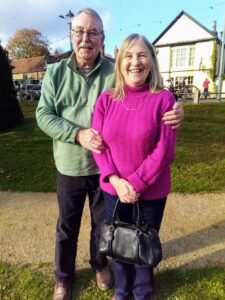Ten years in dementia research: Geoff and Susie’s story
A husband and wife who received a dementia diagnosis in 2013 made a decision shortly after to take part in research to regain a sense of control. Ten years on and they are still embarking on trials, saying the experience has left them feeling empowered, supported and resilient. 
Diagnosis
Geoff Fenwick formerly worked as a business transfer agent – helping people sell their businesses – until his wife, Susie, was diagnosed with early onset Alzheimer’s in 2013, at the age of 64.
He found himself navigating a new role, as a carer for Susie, and having to adapt to the constantly changing circumstances that dementia brings with it.
“If anybody had said to me, ‘how about being a carer’? I would have said that was the last job in the world I would have thought about. I’m not wired that way; I’m a task focused individual,” he said.
“I can look at a problem and find a solution. But becoming a full-time carer… it’s not something I would have contemplated.”
Taking part in research
Geoff and Susie have taken part in a wide variety of trials, from clinical trials to test out new pharmaceutical drugs, to lifestyle research carried out remotely.
Geoff is currently taking part in a research programme looking at how best to support carers. It is called CareCoach and is looking to adapt a Dutch training programme (Partners in Balance) for use in the UK. The study is managed by the University of East Anglia, with assistance from Bradford, Exeter and Nottingham universities.
Geoff said his current study looks at his role as a carer and has helped him make daily adjustments which make life easier for himself and for Susie.
“It’s the carer who does the driving when someone has been given a diagnosis of dementia, so it’s interesting to take part in a study which looks at the carers,” he said.
“The research focuses on techniques for improving a carers ability to handle the many challenges that they face on a day-to-day basis. Topics include: acceptance, communication, handling stress, how to avoid conflict, building a support network and making time for yourself where possible, so I’ve personally found this very useful.”
“Research has helped me”
Geoff said taking part in research generally had helped with their journey through dementia.
“My mother had dementia and my younger brother and his wife took care of all the emotional aspects of looking after her, as they lived near her. I took care of the financial matters. But now I’m involved more closely around navigating the emotional aspect of being a carer for someone close. That bit is tough. Even now I find it hard.
“Research has helped me with that. It has helped me emotionally and mentally, in terms of my own resilience.”
Encouraging others to take part
This is one of the reasons Geoff is keen to encourage other people with a dementia diagnosis to get involved in research by signing up to Join Dementia Research.
“The thing I would say about research is we’re being pro-active, taking control. We’re not sitting back and waiting. It empowers us, which helps build my resilience. I can’t really say if it’s built Susie’s resilience, but it has built my resilience. If I’m able to cope, I can help her cope.
“That’s the primary aspect of it.
“Without exception, everybody we have met through research has treated us with the utmost respect and true kindness. We’ve never been patronised. They understand people have gone through the trauma of diagnosis and understand those emotions.
“I don’t research the disease. It’s all about living well with dementia. The clinical work we are doing may not stop the progression of Susie’s Alzheimer’s, but it has slowed it down and I have no doubt it will benefit our children and grandchildren.
“The final thing I would say is ‘why wouldn’t you take part in research?’ If you are someone who has been newly diagnosed or the carer for someone with dementia, you will benefit from the lived experiences that myself and other volunteers have given over the years.
“Why wouldn’t you share your experiences with those who follow on behind us? It’s human nature. It’s human kindness.”
If you are inspired by Geoff and Suzie’s story, sign up to Join Dementia Research today and see how you too can make a difference.
